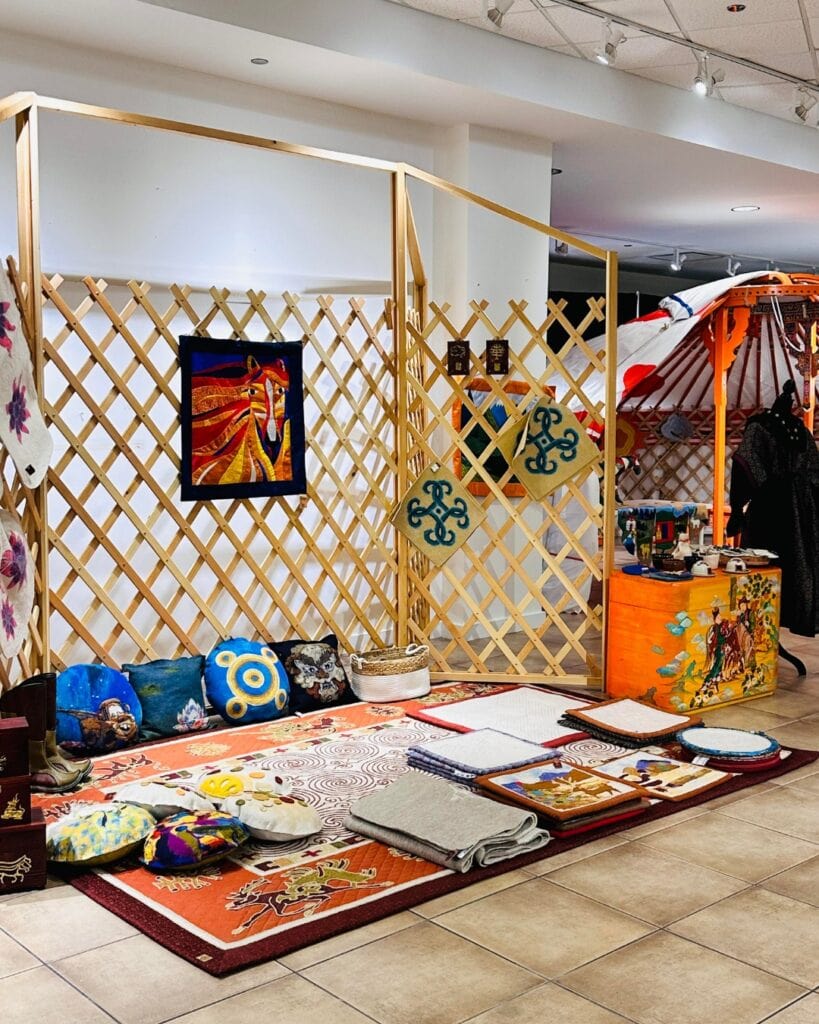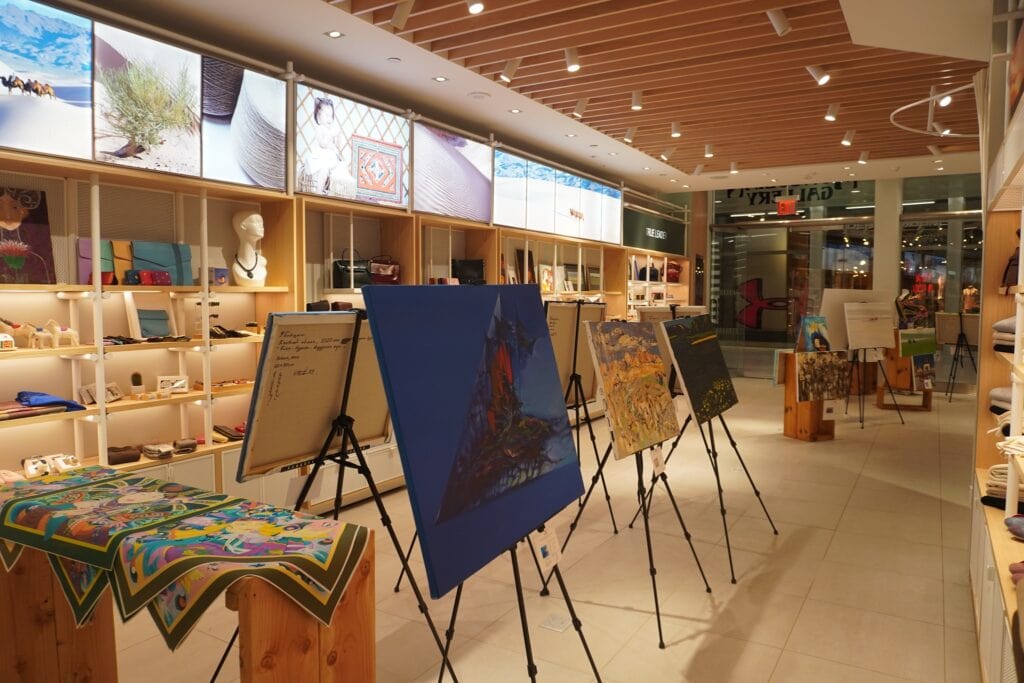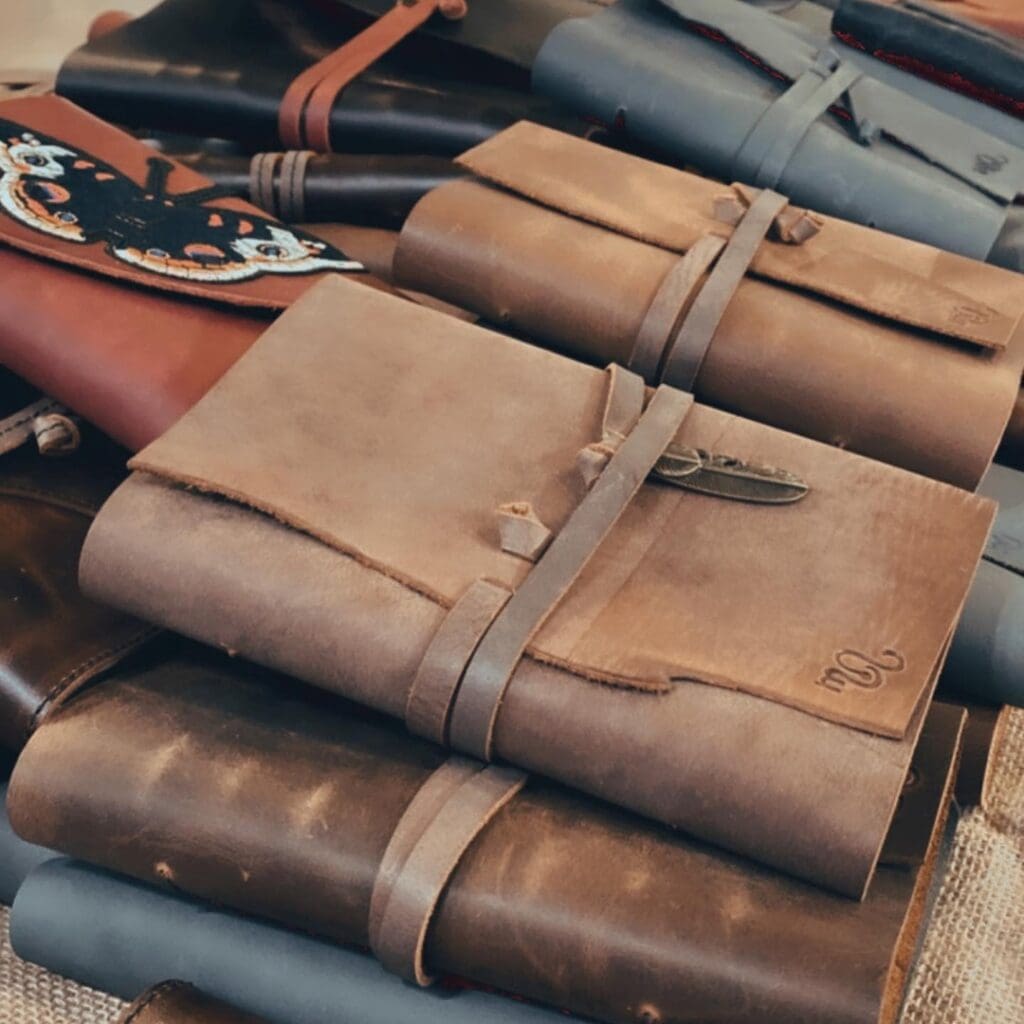If you’ve ever struggled with cold feet in bed or while lounging, CozyFeet might be the perfect solution. Founded during the pandemic by CorinneO& ...
Building an E-commerce in Ethical Fashion with Cashmere Clothes
Written by: Esther Strauss
Esther is a business strategist with over 20 years of experience as an entrepreneur, executive, educator, and management advisor.
Published on February 29, 2024

In this interview, we sit down with Badamtsetseg “Badam” Altantsogt, the CEO of Mongolian Gallery. A trailblazer in the world of sustainable and ethical fashion, Badam shares her journey in shaping a unique brand that merges traditional Mongolian craftsmanship with contemporary style. From sourcing the finest cashmere to championing artisan collaborations, Badam reveals the challenges and triumphs of running a successful e-commerce platform dedicated to ethical practices.
Join us as we delve into the insights and experiences of a visionary leader transforming the landscape of eco-conscious fashion.
Inspiration Behind Mongolian Gallery
SBS – What inspired you to start Mongolian Gallery, and how does your business model reflect the values of sustainability and ethical practices?
Badam – Mongolian Gallery has its roots in the vision of my mother, who founded the business. Her commitment to supporting Mongolia’s small and medium enterprises and increasing the country’s value-added exports inspired me. I followed in her footsteps while adding a distinctive focus on sustainability and ethical sourcing from small, medium, and women-owned businesses to our business model. All our stuff is made with animal products and organic materials and is ethically sourced.
Our commitment to sustainability is not merely a business strategy but a reflection of the enduring nomadic traditions ingrained within Mongolian culture. Long before sustainability became a global imperative, Mongolians were instinctively living it. Nomadic herders, in particular, embodied a sustainable ethos, relying on animal products and the land for their sustenance. They demonstrated unwavering stewardship, diligently tending to their animals and the environment.
This cultural heritage is the cornerstone of our approach to sustainability. We meticulously source our products to uphold ethical practices at every production stage. Moreover, we proudly collaborate with partner brands that share our dedication to sustainability and environmental preservation, staying true to the timeless values that define Mongolian tradition.

Quality Assurance of Luxury Materials
SBS – How do you ensure the quality and authenticity of your cashmere, wool, and leather products?
Badam – At Mongolian Gallery, our dedication to delivering top-quality products while prioritizing sustainability is woven into every aspect of our operation. We implement a meticulous approach across our supply chain to ensure the authenticity and excellence of our cashmere, wool, and leather goods.
First and foremost, we prioritize transparency and accountability by engaging directly with business owners and observing our partner brands’ production processes. This hands-on approach allows us to thoroughly evaluate craftsmanship, materials, and overall quality commitment at every production stage. That way, we ensure that each final product meets our rigorous standards.
One example of our dedication is demonstrated through a partner brand’s active participation in the Responsible Nomad Code of Practices, supported by the Swiss Agency for Development and Cooperation. By aligning with initiatives that promote responsible and ethical practices within the industry, we prove our commitment to providing premium products while championing transparency and accountability in every aspect of our business operations.
We also have exclusive partnerships with reputable brands with local and international certifications. Many of our partner brands proudly boast certifications such as the Noble Fiber and Gold Award from the Sustainable Fiber Alliance — tangible evidence of their adherence to sustainable and ethical practices in producing cashmere, wool, and leather products.
Empowering Artisans
SBS – Can you describe the process of selecting and collaborating with women-owned businesses and local artisans?
Badam – We are deeply committed to supporting women-owned businesses and local artisans to promote economic empowerment and encourage sustainable growth within Mongolia’s entrepreneurial landscape.
With approximately 60% of micro, small, and medium enterprises in Mongolia being owned and operated by women, we recognize the significant contribution that women entrepreneurs make to the country’s economy. We leverage strategic partnerships and initiatives to identify and collaborate with these talented individuals.
We have partnered with the Small Medium Development Agency, a government organization promoting Mongolian small and medium enterprises. We can discover new and emerging brands through their extensive database and network.
Additionally, we work closely with leading cashmere, wool, and leather manufacturers and brands to cultivate relationships and scout potential partner brands interested in testing international markets. We conduct thorough market analysis and facilitate connections to enable these local artisans and businesses to explore new revenue streams and expand their reach beyond domestic borders.

Blending Tradition with Modern Fashion
SBS – How do you balance traditional Mongolian craftsmanship with modern fashion trends in your product designs?
Badam – Traditional elements are paramount in our fashion pieces, especially leather and designer items. This practice adds cultural significance to our products and bridges time-honored Mongolian craftsmanship and contemporary fashion trends.
Cashmere and wool have always been integral to the Mongolian lifestyle, particularly in surviving our harsh winters. Instead of limiting these materials to seasonal layering, our company partners with brands that create cashmere pieces designed for everyday use. This shift allows us to seamlessly blend the comfort of traditional materials with modern, versatile designs.
Furthermore, we collaborate with various brands that specialize in crafting clothing that resembles the traditional Mongolian Deel. These collaborations infuse eye-catching designs to maintain the distinctive elements of the Deel while adding a modern twist. The experience of witnessing the modernization of the Deal has been nothing short of remarkable.
It’s essential to note that our operational objective transcends mere trend-following. Instead, we aim to offer timelessly elegant and uniquely designed products that blend traditional elements with contemporary aesthetics.
E-commerce Strategies for Niche Markets
SBS – What strategies have you employed to successfully market your unique products on an e-commerce platform?
Badam – As a small business partnering with up to 25 fellow small and medium-sized enterprises, the transition to an e-commerce platform initially presented numerous challenges. The hurdles included a lack of financial support for development and insufficient product assets for the website. To overcome these obstacles, our first step was to create a website based on a preset template that stands out in the market. Afterward, we tailored it to meet the needs of our customers and partner brands. With that, we started to require specific sizes and quality product images from our partners.
We work with an SEO development team to ensure the continuous updating of the website and product details. This enhances our relevancy and visibility and provides accurate information.
Due to budget restrictions, competing with larger corporations (our direct competitors) was challenging in the early stages. However, in a saturated market, we strategically emphasize the ethical and sustainable practices integral to sourcing our products in Mongolia. Our pride lies in our partnerships with small and medium-sized businesses, our commitment to responsible business practices, and our dedication to supporting local economies. This definitely sets us apart and resonates with conscientious consumers who value ethically sourced products.
Logistics of Delicate Products
SBS – How do you handle the logistics and challenges of shipping internationally, especially considering the delicate nature of cashmere and wool products?
Badam – It presents unique challenges, especially given Mongolia’s landlocked geography. We approach this with special care and strategic partnerships.
We carefully package and utilize air freight for shipping to guarantee the safe and timely delivery of our delicate cashmere and wool products. While this method incurs additional costs, it ensures that our customers receive their orders swiftly and in pristine condition.
Our collaboration with a trusted freight forwarding company with decades of experience is critical to our success in international shipping. This partnership enables us to navigate the complexities of cross-border transportation seamlessly, ensuring that our products reach their destination efficiently.
Customer Feedback and Product Evolution
SBS – What role does customer feedback play in your business, and how do you integrate it into your product development and marketing strategies?
Badam – Customer feedback is an integral part of our business operations and growth and is especially critical in the selection of brands and products we offer. By listening closely to the preferences and experiences of our customers, we gain valuable insights into what resonates with them and what they like.
Moreover, we believe in creating a transparent and collaborative relationship with our partner brands. That’s why we share all customer feedback we receive in the US directly with them. This lets our partner brands learn about customer preferences, which allows them to incorporate this valuable information into their product development processes.
Over the past four years, the overwhelmingly positive feedback we’ve received from customers has been a driving force behind our continued success and growth. Each piece of feedback serves as a testament to our commitment to delivering exceptional products and experiences.

Digital Marketing and Social Media Influence
SBS – How do you leverage digital marketing and social media to increase brand awareness and sales?
Badam – Our initial steps were to intensify our social media activity, specifically during new product launches, holidays, and cultural events. This yielded positive results, with increased engagement. However, we saw a gap in reaching our target customers effectively.
We openly share our journey on social media as part of our commitment to transparency and information on who makes each piece. We are enthusiastic about reaching our target audience through authentic storytelling and creating content that adds value to our customer’s life. Therefore, we are evolving our strategies to establish stronger connections with our audience and increase our brand presence online with more educational blog posts, cultural community events, and behind-the-scenes.
Moving forward, we’ll explore various strategies to broaden our online presence — collaborating with influencers, targeted advertising across multiple platforms, and analyzing data to fine-tune our plans based on user behavior.
Overcoming E-commerce Challenges
SBS – Can you discuss any challenges you’ve faced in the e-commerce space and how you’ve overcome them?
Badam – Navigating the e-commerce landscape has presented challenges for our business. One of the primary hurdles we encountered was market saturation and misinformation regarding our products, requiring significant investment to establish competitiveness and effectively reach our target audience.
Furthermore, the unique nature of our products, mainly selling luxurious clothing made with cashmere, posed additional challenges in online marketing. Cashmere embodies exceptional quality, sustainability, and comfort, which is evident when customers feel the fabric. Communicating the value proposition of cashmere, including its organic, sustainable properties and unparalleled softness, was difficult to do through the screen and required a nuanced approach to marketing.
We continuously invest strategically in marketing and website development to overcome these challenges and enhance our performance in the e-commerce space. With assistance from our website development team, we focus on authentic storytelling. We sought to differentiate our brand and products by sharing the rich history behind the fabric and each brand we represent to educate and engage our audience about the craftsmanship and values each product possesses.
Optimizing Online Shopping Experience
SBS – What practices do you follow to ensure a seamless and user-friendly online shopping experience for your customers?
Badam – It’s our ongoing commitment. Firstly, we regularly update our website, spotlighting different collection pages each month to introduce the diverse range of products we offer. This way, our customers are always aware of the latest additions to our inventory.
Secondly, we go beyond the transaction by incorporating brand videos showcasing the meticulous handcrafting process behind each product. It’s not just about the item they purchase; it’s about understanding the rich history and the skilled individuals and teams contributing to creating every product. We believe this adds a deeper layer of value to our customers’ purchases.
Thirdly, our dedicated team consistently addresses the technical aspects of our website, ensures a secure checkout process, and optimizes the layout to enhance user navigation. They also diligently identify and rectify page errors so our customers can have a seamless and error-free browsing experience and take full advantage of ongoing discounts or sales throughout their entire shopping journey.
The Future of Sustainable Fashion
SBS – How do you see the future of sustainable and ethical fashion evolving, and what role will Mongolian Gallery play in it?
Badam – The future of sustainable and ethical fashion holds promise as consumers increasingly prioritize eco-friendly and ethical products. The industry is witnessing a shift from overconsumption and mass manufacturing towards circular and regenerative practices. This change is driven by the growing demand for sustainable and eco-friendly options, primarily led by emerging small brands. The urgency of environmental issues, including global warming, has accelerated this transformation, with the fashion industry currently being the third-largest CO2 contributor.
While fast fashion remains relevant, there is a noticeable decline in its growth and popularity. The younger generation, in particular, is adopting a more ethical and responsible approach to shopping. They increasingly support thrift and boutique shops offering curated pieces with a rich history.
At Mongolian Gallery, our journey began by sharing the sustainable and ethical practices rooted in our nomadic heritage, forming the core of our business model. We envision reinforcing this commitment by ensuring our business and partners practice sustainable and environmentally conscious methods in crafting each piece. Our dedication to promoting sustainable materials, ethical sourcing, and supporting local artisans is integral to every decision we make and, fortunately, aligns seamlessly with the evolving expectations of conscientious consumers. We actively contribute to industry discussions and initiatives, sharing our experiences and promoting and initiating sustainable practices. This includes participating in land management projects focused on combating land desertification.
A significant role we play in the industry is education. We take pride in educating our consumers about organic materials, their environmental impacts, their sustainability aspects, and the ethical manufacturing processes behind each piece. Informed consumers can make choices that align with their values, contributing to a more sustainable and ethical fashion landscape.
Inventory and Supply Chain Management
SBS – Could you share some insights on managing inventory and supply chain for an online business dealing with handcrafted products?
Badam – I find that a robust inventory and supply chain system is crucial when operating an e-commerce platform. We faced challenges in managing our inventory because, unlike traditional large retailers, we don’t receive seasonal new inventory. Instead, it highly depends on our partner brands’ manufacturing schedules, airfreight schedules, and the demand for the specific type of products. Managing inventory becomes even more challenging when dealing with a physical store and an e-commerce channel. If the point of sale in your physical store is not connected to your e-commerce channel, it requires continuous manual updates on the back end of your website. Therefore, we have learned that we need to have a system seamlessly connecting the two.
Furthermore, the online shopping return rate significantly increased in 2023. To ensure the smooth return and refurbishment of products online and in our storage, we prioritize an inventory management system that minimizes errors, making our day-to-day operations more efficient and easy to connect to our physical POS and online sales channels.
For small handcrafted pieces, ensuring that each product has a unique SKU or product code and accurate labeling in individual packages and on the storage shelves will be vital to streamlining the shipping process, and anyone on your team can complete them.
We maintain a collaborative relationship with our partner brands, emphasizing transparency and open communication. Regular assessments of product demand, lead times, and seasonal variations are essential to optimize inventory levels. Additionally, a robust inventory management system that integrates with our e-commerce platform streamlines operations. Our supply chain strategy involves close coordination with artisans and manufacturers, emphasizing flexibility to adapt to market demands while upholding our handcrafted products’ sustainability, quality, and authenticity.
Advice for Aspiring Eco-Friendly Entrepreneurs
SBS – Lastly, what advice would you give to aspiring entrepreneurs looking to enter the e-commerce fashion industry with a focus on sustainability and ethical practices?
Badam – I advise staying true to your consumers and the initial reasons behind starting your business. In an e-commerce fashion industry becoming increasingly saturated with brands claiming similar focuses and values, authenticity becomes your key differentiator. To cut through the noise, be genuine to your roots, engage in ongoing communication with your customers, and foster a community for your target audience.
Additionally, having visually compelling assets that convey your messages swiftly is crucial. While personally sharing the passion and story behind your brand is fantastic, it can lose a bit of its human touch when repeated. To communicate your brand’s passion and values effectively, leverage short videos, impactful copywriting, and outstanding product visuals. These elements are essential as these visuals will grab your customers’ attention within a matter of seconds, encouraging them to visit your site and make a purchase.
Lastly, find your niche. Carefully select your target market and devote your efforts entirely to that specific group of customers. Attempting to serve everyone may lead to generalizing your customers and missing out on potential clients due to misunderstanding. Dedicate your focus, refine your message, build a brand that resonates deeply with your chosen audience, and be true to your origins.
Subscribe to Our Newsletter
and gain insider access to cutting-edge business insights and trends.
Featured Resources

How CozyFeet Foot Warmers Help with Cold Feet Issues
Published on February 27, 2025
Read Now

How Plaza Japan Found a Niche in Japanese Anime and Hobby Products
Published on August 26, 2024
Jun Ibaraki, the visionary behind Plaza Japan, transformed his passion for Japanese culture into a thriving e-commerce business that bringsauthentic ...
Read Now

How Natalie Created a Thriving Maternity Clothing Brand
Published on July 29, 2024
In this interview, we dive into the inspiring journey of Natalie Pitts, the CEO and founder of Go MamaMaternity. Discover how Natalie identified ...
Read Now
Comments